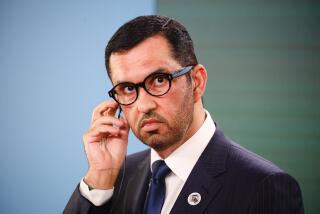Iraqi Leader Shakes OPEC With Threats Against Overproducers : Persian Gulf: Kuwait and United Arab Emirates appear to be targeted in intensified oil dispute.
- Share via
NICOSIA, Cyprus — Iraq’s bellicose Saddam Hussein, bolstered Thursday by a parliamentary proposal that he be elected president for life, has shaken his Persian Gulf neighbors with threats and accusations just before a price-setting meeting of the Organization of Petroleum Exporting Countries.
Chedli Klibi, secretary general of the Tunis-based Arab League, flew to Kuwait for talks with officials of the oil-rich sheikdom, which was accused by Iraqi officials of stealing oil, territorial aggression and driving down petroleum prices in a campaign “inspired by America to undermine Arab interests and security.”
Kuwait countered Thursday with a letter to the Arab League denying the Iraqi accusations and declaring, in turn, that “Iraq has a rich record in its violations of Kuwaiti territory.”
Relations between Iraq and the Persian Gulf oil states of Kuwait and the United Arab Emirates have been strained for months as over-quota production by the two smaller states has glutted world oil markets, driving down the per-barrel price that Iraq and other exporters get for their petroleum.
A recent pledge by Kuwait and the Emirates to stay within their OPEC-assigned quotas apparently did not satisfy Hussein, whose oil minister is expected to push for a higher target price at next Wednesday’s OPEC meeting in Geneva.
The bombastic Iraqi leader, speaking Tuesday in Baghdad before a political gathering marking the 11th anniversary of his ascension to power, threatened unnamed overproducers with violence if they do not rein in their exports.
Calling on God to witness “we have warned them,” Hussein said, “If words fail to protect Iraqis, something effective must be done to return things to their natural course. . . .” At one point he told his responsive audience, “Iraqis will not forget the saying that cutting necks is better than cutting means of living.”
Coming from the man who last spring threatened to “burn half of Israel” with chemical weapons if attacked by Israeli “mass-destruction” weapons, Tuesday’s warning was closely examined by Middle East analysts and government leaders.
Some key gulf newspapers, including Kuwait’s Al Qabas and the Saudi Arabian daily Ash Sharq al Awsat, downplayed or ignored Hussein’s remarks, but the Kuwaiti government showed its concern by dispatching diplomats to key Arab capitals to seek support for its case.
Saudi Arabia’s King Fahd and Egyptian President Hosni Mubarak reportedly telephoned Kuwaiti and Iraqi officials to try to defuse the confrontation.
Meanwhile, Baghdad newspapers reported Thursday that the Iraqi Parliament voted Wednesday to make the presidency, to be filled in a proposed election this year, a for-life job. Hussein, who vowed that the election would demonstrate democratic values in Iraq, has said he would be a candidate. No one else has stepped forward in a country where political challenges to the president have resulted in mysterious deaths or disappearances.
Hussein’s remarks this week were backed by a long letter of complaint, written by Iraqi Foreign Minister Tarik Aziz and delivered to the Arab League, about the oil practices of Kuwait and the United Arab Emirates.
As reported by the official Iraqi news agency, the Aziz letter accused Kuwait of occupying Iraqi territory, an action it charged was tantamount to “military aggression”; of stealing Iraqi oil by tapping into the Rumaila field from the Kuwaiti side of the border, and of driving down oil prices by overproduction, which Aziz charged, has cost Iraq $89 billion in lost revenue over the last nine years.
The Iraqi outburst brought a quick pledge of support from Washington for its small Persian Gulf allies. A State Department spokesman told reporters, “Clearly, we’re strongly committed to supporting the individual and collective self-defense of our friends in the gulf.”
Kuwait and Iraq have a longstanding border dispute, and Baghdad clearly covets some Kuwaiti islands at the top of the gulf. As a major oil producer with reserves reputedly second only to Saudi Arabia’s, Iraq has always been troubled by its short gulf coastline--less than 40 miles--from which to ship its exports.
Some analysts suggested that Baghdad’s bitter accusations were designed primarily to prepare the ground for the OPEC meeting in Geneva, to round up support among other producers to hold Kuwait and the Emirates to their quotas and to drive up the price of oil by raising fears of instability in the gulf.
But with a well-trained, well-equipped army of 1 million, Iraq has turned itself after its long war with Iran into the powerhouse of the Persian Gulf--and when Hussein threatens violence, his remarks are not dismissed as bluster.
NEXT STEP
The Organization of Petroleum Exporting Countries is to meet next Wednesday in Geneva. The oil ministers are expected to fix an official, combined production ceiling and possibly a new reference price for the remainder of 1990. The reference price is the average for all the different grades of crude oil pumped by the 13 member states. OPEC has predicted its base reference price will “soar above and beyond” its current $18 a barrel after the conference. But market analysts say the conference could be contentious.
More to Read
Sign up for Essential California
The most important California stories and recommendations in your inbox every morning.
You may occasionally receive promotional content from the Los Angeles Times.













